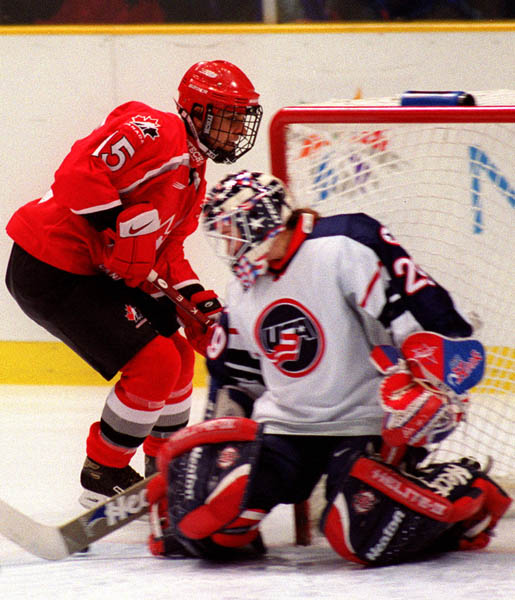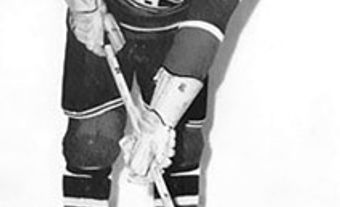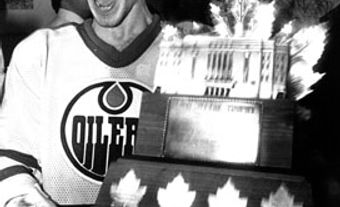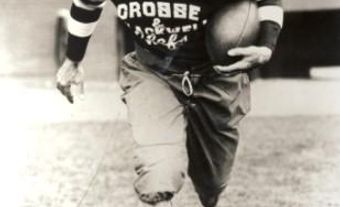
Danielle Goyette, hockey player, coach (born 30 January 1966 in Saint-Nazaire d'Acton, QC). Goyette was a member of the Canadian women’s national hockey team from 1991 to 2008. In 172 international matches, she won eight world championships, twenty gold medals, and four silver medals. She is a member of the Quebec Sports Hall of Fame, Canada’s Sports Hall of Fame and the Hockey Hall of Fame. Goyette was named to the Order of Hockey in Canada in 2018.
Early Sports
Danielle Goyette started playing hockey at a very early age. According to a June 2015 interview with Jeremy Freeborn, she began playing at age four and started competing on a women’s team at 15. Goyette also played tennis, volleyball, basketball, soccer and track and field while growing up, and was a competitive softball player. After completing her secondary studies, Danielle took part in a softball tournament with a team from Saint-Nazaire. She then received an offer to join the "Nettoyeur Seyer" team sponsored by a Saint-Hyacinthe business that supported woman's softball and hockey. In 1985, she played softball for Team Québec at the Canada Games.
National Hockey Team
In hockey, Goyette quickly ascended the ranks, distinguishing herself everywhere she played to such a degree that after a stint with the Québec team she joined Canada's national team, in 1991. The following year she took part in her first world championship.
In 1996, Goyette moved to Calgary for five months in order to improve her English, and worked at various casual jobs while continuing to train twice daily. She became increasingly at ease in this city (where the national team resided), and decided to stay there for good — particularly as there was talk of women's hockey becoming an Olympic sport. This became a reality at the 1998 Nagano Olympic Winter Games.
Nagano 1998
The night before the Nagano Olympic Winter Games opening ceremonies, Goyette learned that her father had lost his battle against Alzheimer's disease. Devastated, she wanted to return home immediately, but after some soul searching she decided to follow the advice of her sisters, who urged her to stay in Japan. Facing these difficult moments even strengthened her determination.
Right from the start of the games, Goyette made women's hockey history by scoring the first goal of the tournament and recording a hat trick. In the finals, nine days later, Canada suffered a cruel defeat against the United States. By the close of these emotionally charged Olympics, Goyette had demonstrated that she was an exceptional athlete, dominating the scorekeeper's column with eight goals and ranking second on the scoring list.
Following Nagano, she pondered her future when recurring shoulder injuries required her to undergo surgery (during her career she would suffer more than twenty shoulder dislocations). However, the operation was successful and she trained zealously, ranking among the top three on the national team's evaluation tests.

Salt Lake City 2002
In 2002, at the Olympic Winter Games in Salt Lake City, Canada had a chance to bring back the gold. Despite three other world championship titles, Team Canada lost the eight exhibition games played against the United States in early 2002. The pressure was high.
After winning the three matches in the preliminary round, Canada faced its long-time rival in the finals. The Canadians were at a disadvantage — playing before an American public and with an American referee. Goyette did not have the opportunity to show off her offensive talent, since the referee called 11 penalties against the Canadians. However, in the second period, she executed a shot that on the rebound allowed her team to even the score 1 to 1. With one second remaining in the second period, Canada scored another goal. The game ended in victory for Canada, and Danielle Goyette earned 10 points including three goals during the tournament, winning her first Olympic gold.
Turin 2006
History repeated itself at the Turin Olympic Winter Games in 2006. After some thought, and despite her 39 years, Danielle Goyette ranked among the best in the national team's aptitude tests. During the month of January, a member of the Canadian Olympic Committee told her in confidence that she had been chosen as the Canadian flag bearer for the opening ceremonies. She returned with a second Olympic gold medal.
Records and Honours
Danielle Goyette later accepted an offer to be head coach for the women's team at the University of Calgary, and she retired from competition in January 2008. In 172 international matches, she won eight world championships, twenty gold medals, and four silver medals. When she retired, she was one of three Canadian women's hockey players to have scored more than 100 goals, ranking second in terms of total points scored. She was inducted into the Quebec Sports Hall of Fame (Le Panthéon des sports du Québec) in 2010, the International Ice Hockey Federation (IIHF) Hall of Fame in 2013, Canada’s Sports Hall of Fame in 2015, and the Hockey Hall of Fame in 2017. Goyette was named to the Order of Hockey in Canada in 2018.
See also In Conversation with Danielle Goyette.

 Share on Facebook
Share on Facebook Share on X
Share on X Share by Email
Share by Email Share on Google Classroom
Share on Google Classroom



